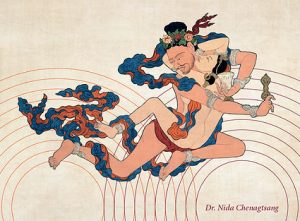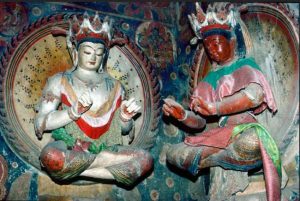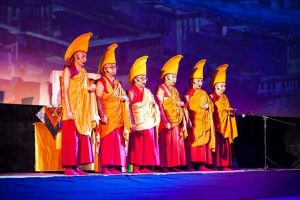
Does Amitabha’s “other-power” deliverance violate the Law of Causal Condition?
In my last article, we discussed the 18th Vow made by Amitabha Buddha for unconditionally delivering sentient beings of the Ten Directions to his splendid Land of Bliss. This was Amitabha Buddha’s original intent and fundamental purpose when he attained perfect enlightenment and accomplished the creation of the Pure Land 10 eons ago.
As far as Amitabha Buddha’s awesome power and great compassion in delivering sentient beings is concerned, Amitabha’s deliverance is pro-active, equal, and unconditional.
Many Buddhists misinterpret the three essentials listed in the 18th Vow—faith, aspiration, and practice—as being “conditions” for rebirth in the Land of Bliss. But they are actually Amitabha’s free “gifts” contained in the six-character great Name (Na-Mo-A-Mi-Tuo-Fo), for all aspirants to rebirth in the Pure Land (for further details, please refer to my previous article).
Still, some Buddhists would like to change the conversation from Amitabha Buddha’s great compassion to sentient beings’ diligence and effort in the success of rebirth in Amitabha’s Land of Bliss. Instead of considering the “conditions of rebirth,” they argue that there must be a “cause of rebirth” produced by a Pure Land aspirant.
They refer to the Law of Causal Conditions (in other words, karma), and claim that there must be an internal or main cause “initialized” by the person who wishes to be reborn in the Land of Bliss. Amitabha’s vow-power merely serves as an external condition or supplementary cause “catalyzing” the aspirant’s rebirth.
This seems to make sense. However, it should be carefully noted that Master Shandao taught Amitabha-recitation practice is an “augmentative cause” or “strong condition,” which is different from an ordinary causal condition.
“Strong condition” means a condition that is so powerful that it alone determines the effect without other factors. This condition can also act as the internal cause and override the main cause without any obstruction, so it is also known as an “augmentative cause.”
In this respect, Amitabha-recitation practice is “augmentative karma” through which the reciter makes five different karmic connections with Amitabha Buddha. These are listed by Master Shandao as follows:
1. Augmentative Karma of the Elimination of Offenses
2. Augmentative Karma of Protection and Support
3. Augmentative Karma of Seeing Amitabha Buddha
4. Augmentative Karma of Being Embraced for Rebirth
5. Augmentative Karma of Verifying Rebirth
Merit-dedication and rebirth-aspiration by all those in the nine levels of the three tiers
From the perspective of sentient beings, those who aspire to be reborn in the Land of Bliss by dedicating their merit and virtues attained through the meditative and non-meditative practices are considered to be practitioners on the “Path of Importance,” as defined by Master Shandao, the de facto founder of the Pure Land school.
He states: “The path of Importance is the two teachings of meditative virtue and non-meditative virtue, as expounded in the Contemplation Sutra. Meditative virtue means to still one’s anxiety by ceasing all thought, and non-meditative virtue means to eliminate one’s evil and nurture goodness. This is the path if one dedicates these two virtues and aspires to be reborn [in the Pure Land].”
All those in the nine levels of the three tiers are considered to be practitioners of the Three Meritorious Deeds who aspire to be reborn in the Land of Bliss. Some of them successfully accumulate merit and virtues and genuinely dedicate them for rebirth, but some of them do not.
The “successful and genuine” practitioners in the highest tier are praised by Amitabha Buddha near the end of their lives: “Dear Dharma practitioner, you practice the Bodhisattva Way and understand the foremost teachings. That is why I now come to welcome and receive you!” (From the text of “rebirth for the middle level in high tier” in the Contemplation Sutra)
The “successful and genuine” practitioners in the middle tier are praised by Amitabha Buddha near the end of their lives in this way: “Dear virtuous (wo)man, since you are virtuous and have followed the teachings of the Buddhas of the three periods, I have come to welcome you!” (From the text of “rebirth for the middle level in medium tier” in the Contemplation Sutra)
For the “unsuccessful and non-genuine” people who fail to accumulate merit and virtues for genuine dedication toward rebirth in the Land of Bliss, they can recite “Namo Amitabha Buddha”, even in the very last moments of life. They are also praised when Amitabha Buddha comes to receive them: “Dear virtuous man, by calling my Name, your evil karma has been extinguished, and I have come to welcome you.” (From the text of “rebirth for the high level in the low tier” in the Contemplation Sutra)
Any cause of rebirth is acceptable as long as a person aspires to be reborn with singleness of mind
What is meant by “merit-dedication?” Master Shandao says that the substance of the Contemplation Sutra is “merit-dedication and rebirth-aspiration with singleness in mind.”
What is meant by “singleness of mind”? Master Shandao explains it in the text on the “mind of merit-dedication and rebirth-aspiration” (in the Commentary on the Contemplation Sutra) with his parable of the Two Rivers and a White Path. It says, “With singleness of mind and right attention go forward at once; I will protect you! Do not be afraid of falling into the perils of fire or water!”
That is to say, “singleness of mind” refers to the 18th Vow, Amitabha’s Fundamental Vow eventually, and the Three States of Mind are also consolidated to “singleness of mind.” Any cause of rebirth dedicated, whether genuinely or non-genuinely, by sentient beings for rebirth in the Land of Bliss, will NOT be cared about by Amitabha Buddha, as long as they aspire to be reborn with “singleness of mind”, really want to return “home.” This clearly indicates that Amitabha-recitation in accordance with Fundamental Vow is the augmentative karma for the elimination of offenses, as well as the act that assures rebirth.











